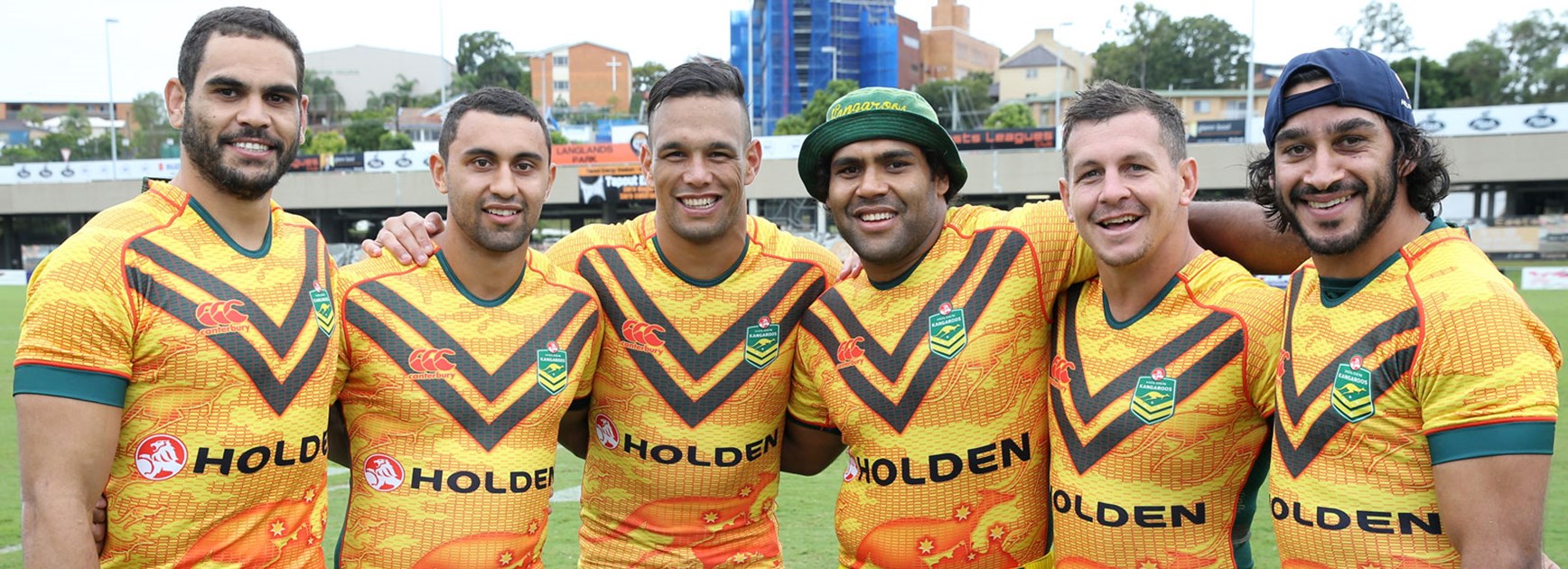
The adoption of an Indigenous war cry by the Kangaroos would not only honour the growing number of Indigenous players in the team but represent a groundbreaking step forward for the nation, according to former NRL star Dean Widders.
For the first time in Australian Rugby League history, six players of Indigenous heritage – Greg Inglis, Alex Johnston, Will Chambers, Johnathan Thurston, Greg Bird and Sam Thaiday – have been selected in the national starting team to face New Zealand at Suncorp Stadium on Friday night.
Five Indigenous girls have also been selected to play for the Jillaroos against the Kiwi Ferns, prompting Thurston to this week further push for the Indigenous war cry unveiled at the All Stars game in February to be adopted by the national team.
With a short preparation this week and being the only Test of the year for the Kangaroos it won't become possible until 2016 at the earliest but Widders believes if it comes to fruition it will represent the greatest legacy the champions of today can leave when they retire.
"For Indigenous boys to have played such a big part in [the Kangaroos'] success over the years is a good story that people will look back on and hopefully it does a lot outside of footy," said Widders, who now works in education and welfare within the NRL.
"It would be fantastic that our sport could be at the head of some sort of movement like that. It inspires a generation of Indigenous kids because they see their culture being shown proudly on the international stage by some terrific players and legends in the game, non-Indigenous and Indigenous.
"It also boosts the rest of the country to learn about the Indigenous culture and how it is to be shared, how this country has a great history of Indigenous culture and that we should all be proud of it.
"With the war cry that the boys did at the All Stars, you don't have to be Aboriginal or Torres Strait Islander for it to mean something to you. It can mean something to you whether you grew up in Brisbane, the bush or in the middle of Sydney.
"You can find a meaning for yourself because it is about your journey, your family's journey and your people's journey and where you've come from and how you're pulling all that together to make you strong today.
"'JT' and Greg [Inglis] are very passionate about getting it on that stage and I think it could do so much for Australian sport and also outside of sport. It would be great to see these guys take those steps one day."
In naming Arthur Beetson to captain the Kangaroos in 1973 rugby league became the first sport in Australia to have an Indigenous person lead a national team and there have been numerous Kangaroos representatives of Indigenous heritage in the four decades since.
But never have their numbers been so great and Widders believes the introduction of the All Stars concept in 2010 has helped to fast-track the next generation to reach the game's highest level.
"The All Stars game has really given a lot of our boys the confidence to shine on the big stage," said Widders, who coaches the Women's Indigenous All Stars team. "It gives them an opportunity to play in a big representative game with the best players and against the best players.
"It does a lot for inspiring our kids and provides positive stories for our kids but it also teaches the rest of the country about the good side of Indigenous people. How proud these guys are and how hard they've worked, so there are a lot of positive stories that spin off the back of it.
"To see these guys with a big representation playing for their people but also their country and doing it with their brothers on the world stage, both Indigenous and non-Indigenous, is fantastic.
"There is going to be another generation off the back of this and it's going to be interesting to see what these guys inspire. The legacy they leave behind is going to be good to watch."
And, as Widders is quick to point out, it is not just the Kangaroos who are proving an inspiration as the growing exposure of the Jillaroos reaches young Indigenous girls who are similarly enamoured with rugby league.
Mahalia Murphy, Latoya Billy, Jenni-Sue Hoepper, Tallisha Harden and Casey Karklis will represent the Jillaroos on Friday evening and with the match to be streamed live on NRL.com provide another sporting moment for Indigenous women to cherish.
"I coach a team at Redfern and we've got 11 young girls in our team who play against the boys every week," Widders said. "They look up to these girls and these girls again are going to inspire another generation below them.
"I don't think Indigenous women have had something like this happen since Cathy Freeman won her gold medal [at the 2000 Sydney Olympics]. I can't think of something as big as this in a sport that they all love now with the Jillaroos getting a lot more exposure.
"Young Indigenous girls, they need role models and our girls are rugby league fans. It's got as much power with the young girls as it has with the young boys."

